I am Not a Robot!
This is another extremely well written piece! Much food for thought…x
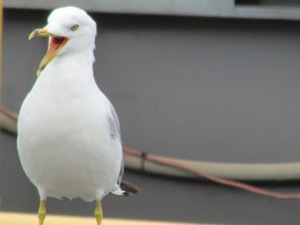
There. I said it. It is in print. Why does the computer continually ask me if I’m a robot? The reason is terrifying. Computers a.k.a. Robots have the ability to mimic us. Are you afraid yet? You should be…
We all know and love the fact that our computers anticipate us and make some things easier. But should we? We bandy about phrases like AI, Artificial Intelligence and I have said more than once that this is not just something for the future, it is already here. Has it reached sentience? I don’t know. But maybe that’s the only way to save our planet, to let it go. Do I trust computers? Absolutely not. First reason is that we designed them and by definition we are fallible ergo our creations are fallible. And two, what if we do reach that state that we keep talking about and computers do become…
View original post 297 more words
A labyrinth of meanings…
A post from 2017: some mythical musings and a recommended read.
 Every now and again, most writers come across – or have a fascination for – . a word which either has contrary meanings or some peculiar draw, don’t they? My word of the moment (and for a while now), is labyrinth. I’ve used it several times and thought I knew what it meant. Wrong! Well, it wasn’t completely incorrect, as many other writers have used it in the same way…I’ll explain… (Have your cocoa and slippers ready…)
Every now and again, most writers come across – or have a fascination for – . a word which either has contrary meanings or some peculiar draw, don’t they? My word of the moment (and for a while now), is labyrinth. I’ve used it several times and thought I knew what it meant. Wrong! Well, it wasn’t completely incorrect, as many other writers have used it in the same way…I’ll explain… (Have your cocoa and slippers ready…)
Labyrinth is defined as meaning “A complicated, irregular network of passages or paths, in which it is difficult to find ones way.” Or “A complex structure of the inner ear.” (While, of course, interesting to anyone with ear problems, I’ll respectfully put the second definition to one side.) The Cambridge English dictionary, however, defines the meaning as being a tad different (and an aid to pen chewing scribblers, or unsure key tappers) It’s…
View original post 610 more words
The trials & tribulations of a writer
A blast from the past !!
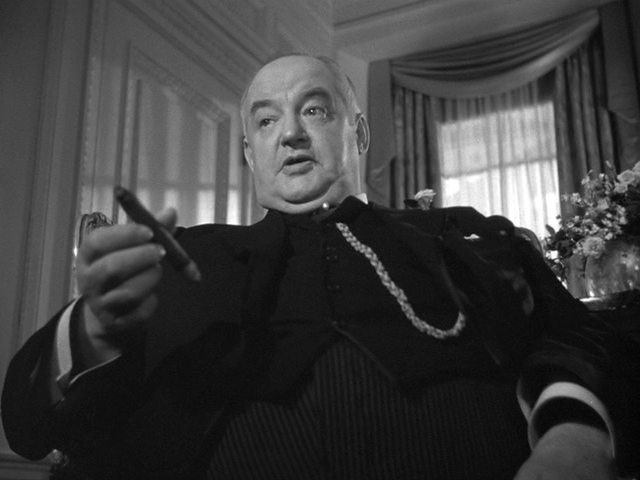 After the unmitigated triumph of my novel STRANGLERS IN THE NIGHT some twenty plus years ago, I strode purposefully forward in my Bali Manic shoes and Chanel suit, inhaling the sweet smell (No.5) of success, sipping champagne en route to a glittering literary future. And then the cookie crumbled, as they say…
After the unmitigated triumph of my novel STRANGLERS IN THE NIGHT some twenty plus years ago, I strode purposefully forward in my Bali Manic shoes and Chanel suit, inhaling the sweet smell (No.5) of success, sipping champagne en route to a glittering literary future. And then the cookie crumbled, as they say…
The head Judge in the competition which led to my book’s meteoric rise, was foolhardy enough to admit having bribed the other judge as he was hopelessly in love with me… Sales ceased, interest flagged, and talk of a film was out the window. I was totally flabbergasted and cast down; as was the overweight, aged Judge who managed to bankrupt himself. A deep abyss yawned before both of us. I was vaguely flattered, but how could he have done such a thing?!
If you believe that, you’ll believe anything! I don’t even know where it came from……
View original post 398 more words
The Phrontistery revisited – again
Phrontistery – “a thinking place, from ‘phroneein’ to think.”
Here’s an early post, from way back in 2017. I was a woman of fewer (but longer) words…
Now and then, you hear of writers’ “drying up” or “burning out,” but, for one reason or another, the older I get, the more ideas arrive…Take this morning – at the early hour of 5.15, damn… there was a wide awake queue of “subjects” (animated like an excitable group of Star Trek conference devotees) suggesting a variety of, mostly, serious topics. Keen to write something in a lighter vein, with maybe a humorous slant, I patiently listened to my babbling muses, but had to refuse their, more serious, offerings. So, what to write? Sometimes, too many ideas are worse than none! They can overwhelm and leave you confused.
The very name of “Trump” (can one word/person be a cliche?) and connections left me cold; “Literary Advice” sounded like preaching – how many more tips can one suggest without boring the pants off people? Eventually, I decided to visit “The Phrontistery.” Again. For newcomers to my – lately – rare posts, The Phrontistery is a haven for words which I enjoy visiting now and then.
A Facebook friend by the name of Aurora mentioned the word CODDICOMPLE :”To travel purposefully toward an.- as yet – unknown destination,” so was quite apt for the occasion, and led me to visit the above virtual learned ‘establishment.’ (Thanks Aurora!) If you enjoy words, it’s always fun.
Quite a few intrigued…AMORETTO: “A cherub or spirit of love” (thought it came in a bottle?!), ABBOZZO: “A preliminary sketch,” Really! ABRA: “A narrow mountain pass.”” (Not to be confused with ”A Bra”: (A feminine undergarment.). The decidedly odd ACERSECOMIC: “One whose hair has never been cut!” AFTERWIL: “Locking the barn after the cows have been let out…”.(always thought it was a horse) .And, my favourite for now: ALLEMAIN: “An enormous pudding, out of which acrobats leap!” So graphic and sounds such fun! Surely, a perfect prop for the amazing Cirque du Soleil.
As expected from such a comprehensive list of words, many are archaic: more at home in a Dickensian story: Words like BANTLING: “Brat, whelp, bastard child,” BASTINADE: “To beat with stick or baton, ESPECIALLY ON THE FEET?!” Then there’s DEBLUBBERED: “Disfigured from weeping.” BICACIOUS: “Fond of drinking,” (timeless!), and last, for now, BLETHERSKATE: “Garrulous talker of nonsense.” The latter group is perfect for including in a Victorian who-dunnit! Ummm, I have an idea…
© Joy Lennick 2023
Ötzi the Iceman
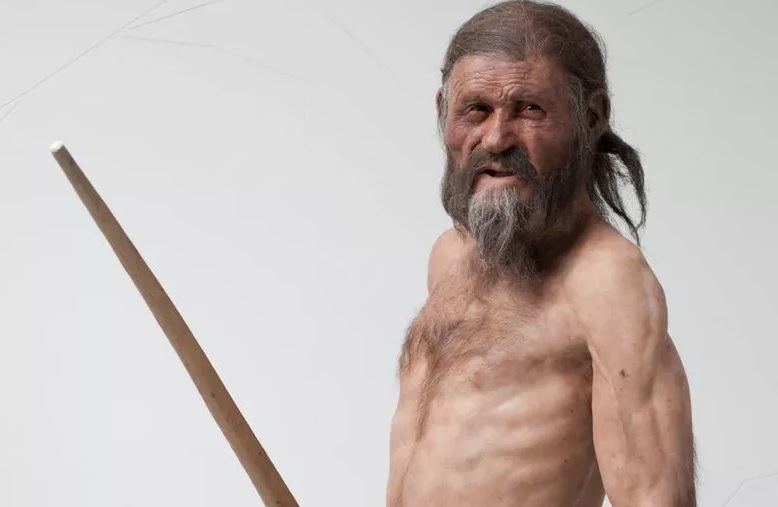 Concentrating on keeping a foothold on the dangerous glacier, high up in the Ötztal Alps on the Italian/Austrian border, German tourists Helmut and Erika Simon may have thought, fleetingly, about coming across The Abominable Snowman. But they must have been even more astonished – or perhaps incredulous would be a better word – to discover the mummified, clothed body of a man, who was later estimated to have been there for an astonishing 3,500 years! The year was 1991; without doubt a red-letter day in their lives.
Concentrating on keeping a foothold on the dangerous glacier, high up in the Ötztal Alps on the Italian/Austrian border, German tourists Helmut and Erika Simon may have thought, fleetingly, about coming across The Abominable Snowman. But they must have been even more astonished – or perhaps incredulous would be a better word – to discover the mummified, clothed body of a man, who was later estimated to have been there for an astonishing 3,500 years! The year was 1991; without doubt a red-letter day in their lives.
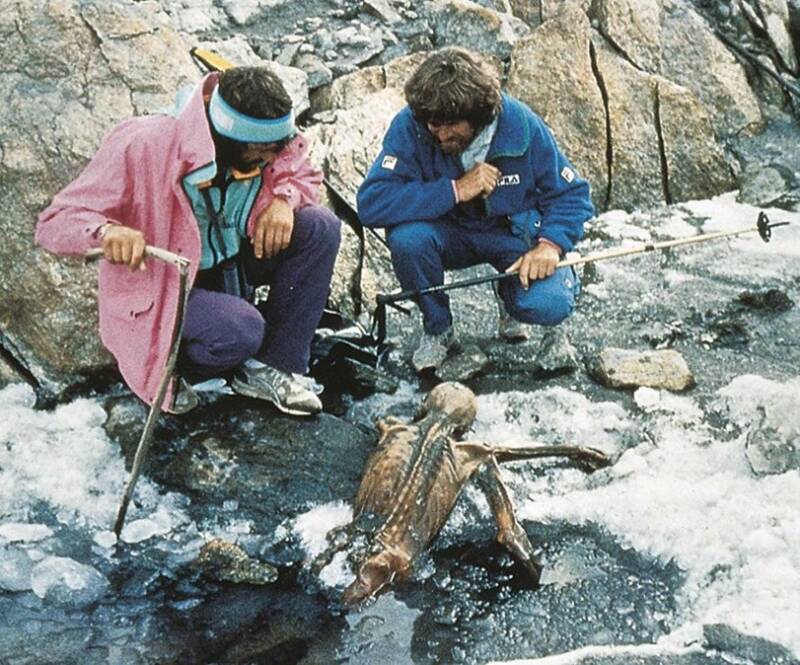 Nick-named Ötzi, the discovery must have excited a whole raft of people, keen to learn more about their frozen find. It was believed he lived from 3,350 to 3,105 BC. He was around 45 years old when he died (probably violently, from an arrow wound). He was 5′ 2” tall, wiry and took a shoe-size of size 8. He was also left-handed. He wore a woven grass cloak, fur hat, a hide coat, skin leggings and had quite elaborate deer skin shoes that were lined with grass.
Nick-named Ötzi, the discovery must have excited a whole raft of people, keen to learn more about their frozen find. It was believed he lived from 3,350 to 3,105 BC. He was around 45 years old when he died (probably violently, from an arrow wound). He was 5′ 2” tall, wiry and took a shoe-size of size 8. He was also left-handed. He wore a woven grass cloak, fur hat, a hide coat, skin leggings and had quite elaborate deer skin shoes that were lined with grass.
They also found in his possession a half-finished bow and several arrows; a beautifully preserved copper axe; and a rudimentary ‘medicine kit’ of birch fungus, which has anti-inflammatory properties.
 His body was heavily tattooed, with 61 distinctive markings. It has been suggested these may have been therapeutic in nature, an early form of acupuncture.
His body was heavily tattooed, with 61 distinctive markings. It has been suggested these may have been therapeutic in nature, an early form of acupuncture.
For some odd reason, I compared getting up that morning and going through my simple ablutions, dressing etc. with Ötzi’s experience. I doubt he had slept as well, or as comfortably. No quick ‘cuppa’ for him, he had to make a fire to boil the water for starters.
Scientific analysis of his stomach suggested he had consumed dried meat from red deer and wild goat, as well as grains. They also found traces of fruits, seeds and berries.
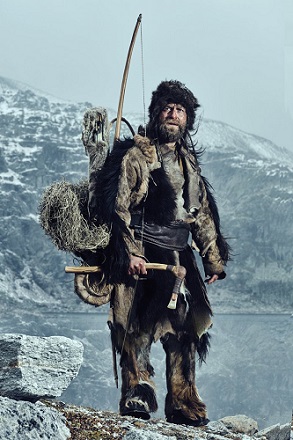 He would, of course, also have had to make his whole outfit, starting with his ‘tit-for-tat’ (Cockney slang for hat) by killing a furry animal, and then a larger animal to make his own coat and leggings. (No Izzi Solomon, the tailor around the corner for him… He would have been disgusted with the stitching!?)
He would, of course, also have had to make his whole outfit, starting with his ‘tit-for-tat’ (Cockney slang for hat) by killing a furry animal, and then a larger animal to make his own coat and leggings. (No Izzi Solomon, the tailor around the corner for him… He would have been disgusted with the stitching!?)
It is doubtful Ötzi would have stopped hunting to indulge in a morning Cappuccino and croissant, but I’m hopeful he was planning to call in Cave No. 3, wherein lived a comely maiden. Or maybe he was already ‘spoken’ for and happily married, with two little Ötzis.
I like to think he enjoyed the sun on his face and the wind in his hair now and then, and – who knows – even experienced love.
© Copyright Joy Lennick 2022
Editing and additional research – Jason Lennick
Autumn Leaves

Nature in her wisdom
makes way for another season;
Summer acquiesces –
makes us muse upon the reason.
Now Autumn’s inspired paint-brush
has burnished Summer’s trees:
has stippled, veined and spotted
and prettied up her leaves.
Amber, ochre, scarlet leaves,
drift down as light as whispers,
to kiss this Mother Earth of ours
like hushed and soft-sung vespers.
The light is muted, delicate –
sky quilted grey and blue,
as Zephyr’s cheeks, extended, blow
awry the multi-coloured carpet,
oh so new.
© Copyright Joy Lennick 2022
Photo by Jeremy Thomas on Unsplash
Curiosity and Ageing
“In old age, we should wish still to have passions, strong enough to prevent us turning in on ourselves: to keep life from becoming a parody of itself.”
— Simone de Beauvoir
As my curiosity and ageing antenna have been twitching a lot lately, I thought I’d tackle them together. Obviously, without curiosity, there would be no life. For some, strange reason in my late eighties, I became more curious than ever – probably because I was aware of the clock ticking?!
 Oh, how far humanity has come over the years! The ingeniousness of human beings is mind-blowing. Take one of the most basic human needs. Before paper had been invented, leaves or moss was used for personal hygiene purposes. For the Romans a sponge on a stick did the trick, but elsewhere broken pottery and corncobs(!) were made use of. The mind boggles…
Oh, how far humanity has come over the years! The ingeniousness of human beings is mind-blowing. Take one of the most basic human needs. Before paper had been invented, leaves or moss was used for personal hygiene purposes. For the Romans a sponge on a stick did the trick, but elsewhere broken pottery and corncobs(!) were made use of. The mind boggles…
The Chinese had been using toilet paper for centuries, but it was not until 1857 that the western world enjoyed the luxury of the first mass-produced toilet tissue, thanks to New Yorker Joseph Gayetty.
 Early in the 1800s, two important discoveries were made: in 1804 morphine was extracted from the poppy plant by German pharmacist Friedrich Serturner, and the first modern general anaesthetic was created by the Japanese physician Hanaora Seishu, which he named Tsūsensan.
Early in the 1800s, two important discoveries were made: in 1804 morphine was extracted from the poppy plant by German pharmacist Friedrich Serturner, and the first modern general anaesthetic was created by the Japanese physician Hanaora Seishu, which he named Tsūsensan.
Time passed, as it does and, over the years, many minds designed and patented wondrous things.
Basic as it sounds, and looks, what a fabulous idea is the zipper. Faster than buttons and so convenient, Trousers, skirts, jackets and cushions, etc., all benefited from the mind of Whitcomb Judson in the year 1891, and just earlier, in 1888 the quill writers must have been delighted with the design of the ballpoint pen by a John L.Loud. And then – surely magic was in the air? – in 1892 exhausted housewives must been ecstatic when Thomas Ahearn invented the first electric oven!
In the 1800s, invention after invention was patented, enough to make folk wonder at the proliferation of it all, and they grew in stature in the 1900s with the first instantaneous transmission of images on the television – with a broadcast carried out in Paris in 1909, by Georges Rignoux and A. Fournier.
1915 saw the very first military tank – nicknamed Little Willie, invented in Great Britain by Walter Wilson & William Tritton. It would be the precursor to the tanks used in the First World War.
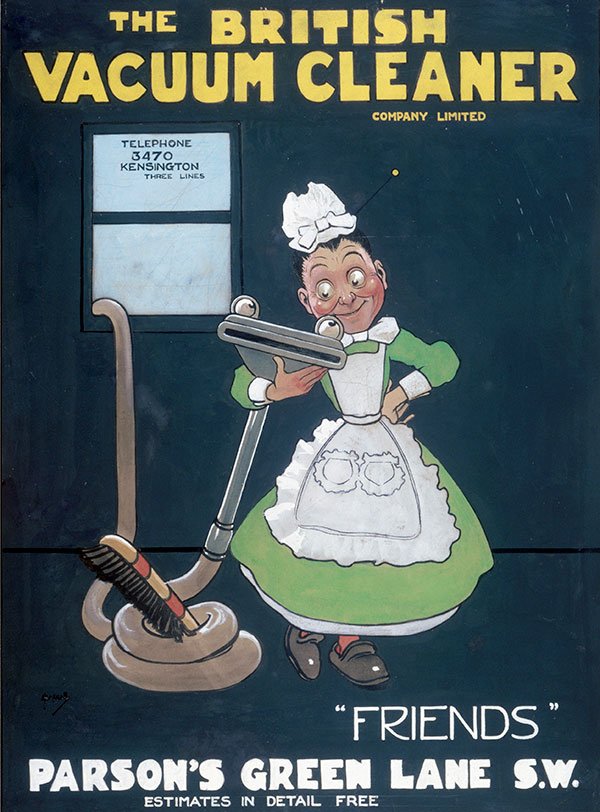 In the early 1900s, the first vacuum cleaners were huge steam or horse-drawn machines that worked from the street, with long hoses that went into your home through the windows.
In the early 1900s, the first vacuum cleaners were huge steam or horse-drawn machines that worked from the street, with long hoses that went into your home through the windows.
Then, in 1907, department store janitor James Murray Spangler, of Canton, Ohio invented the first portable electric vacuum cleaner. Unable to produce the design himself due to lack of funding, he sold the patent in 1908 to local leather goods manufacturer, William Henry Hoover, and the rest, as they say, is history.
 1928 saw a truly momentous medical breakthrough, when Penicillin was discovered by the Scottish physician and microbiologist Alexander Fleming. For this ground-breaking work, he shared the 1945 Nobel Prize in Physiology or Medicine with Howard Florey and Ernst Boris Chain.
1928 saw a truly momentous medical breakthrough, when Penicillin was discovered by the Scottish physician and microbiologist Alexander Fleming. For this ground-breaking work, he shared the 1945 Nobel Prize in Physiology or Medicine with Howard Florey and Ernst Boris Chain.
Penicillin was extremely difficult to isolate, so it wasn’t until the 1940s that it was manufactured on a large scale (in the US), and became more widely available, saving countless lives.
Fast forwarding to 1957, the first personal computer that could be used by one person and controlled by a keyboard was designed by John Lentz at Columbia University. Sold by IBM, the IBM 610 weighed around 800 lbs and cost $55,000. Quite a difference from the lightweight desktop and laptop PCs of today!
For more history of inventions and discoveries, check out Wikipedia – it’s a mine of Information! (and if you can spare a dime or two, do support this great resource).
© Copyright Joy Lennick 2022
Editing and additional research – Jason Lennick
Pictures: Unsplash.com, Pixabay.com, The Science Museum (UK) and Wikipedia.
Serendipity and Coincidence
There are, of course, simple serendipities and coincidences – they happen all over the place and at any time. And then there are those extraordinary ones which defy belief. Like the time Mr and Mrs Smythe went, on a whim, to Brazil, and the couple from No. 34 were staying in the same hotel!! And they hadn’t seen them for months…
Naturally, occurrences can either bode well or not for the people involved. Stray from the path, and you could find your ‘blind date’ is actually your wife or husband, as the case may be. Whoops!
“What people call serendipity sometimes is just having your eyes open.”
— Jose Manuel Barroso
 I came across the most serious ‘coincidence’ I had ever encountered, while collating facts for my only novel The Catalyst. The book is based on the actual terrorist bombings of several London trains and a bus in 2005, the aftermath and a few fictitious survivors’ stories and fate. Because of the actual dead and injured, the subject was too delicate to write about at the time, and it was several years before I actually wrote the story and had it published.
I came across the most serious ‘coincidence’ I had ever encountered, while collating facts for my only novel The Catalyst. The book is based on the actual terrorist bombings of several London trains and a bus in 2005, the aftermath and a few fictitious survivors’ stories and fate. Because of the actual dead and injured, the subject was too delicate to write about at the time, and it was several years before I actually wrote the story and had it published.
The Foreword to my tale reads as follows:
“It’s hard to believe in coincidence, but it’s even harder to believe in anything else.”
— John Green (Will Grayson, Will Grayson)
THAT FAR-REACHING ARM Coincidence, which seems to weave its disembodied way through all manner of innocent and drama-filled occurrences and ‘incidents,’ again came to the fore on the 7th day of July in 2005.
Press reports at the time claimed an anti-terror drill was organized and carried out that same day on behalf of the Metropolitan Police, by Peter Power, a former high-ranking policeman and Managing Director of Visor Consultants. Known to only a handful of people, a fictional ‘scenario’ of multiple bomb attacks on London’s underground was, incredibly, being played out just after the time the actual bomb attacks took place, stretching the meaning of coincidence to its utmost limit.
The coincidence of the innocent and the truly dreadful events carried out on that day, was said to be ‘Disconcerting’… but apart from information given to accredited journalists and academics, no further comments were forthcoming from Peter Power because of ‘The Extraordinary number of messages from ill-informed people.’ (Reported on 13th July.)
The news reports fanned the flames of conspiracy theories and high-level cover-ups, so familiar to us today in the aftermath of any major incident or attack.
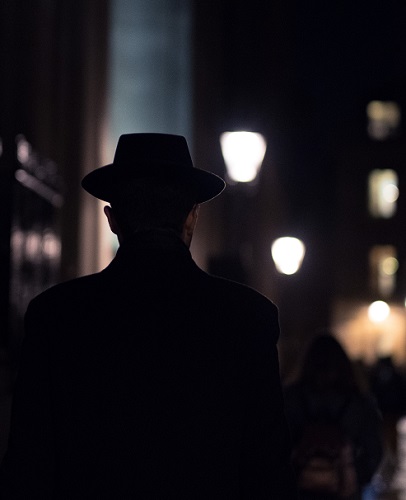 The press also reported that the former Mayor of New York: Rudolph Giuliani was visiting London at the time of the attacks. He was staying at The Great Eastern Hotel (close to Liverpool Street station ) where TASE: The Tel Aviv Stock Exchange, was hosting its Economic Conference. Israel’s Finance Minister, Benjamin Netanyahu, was the keynote speaker. Presumably this was intended as further fuel for the fire of mysterious and sinister goings-on. Newspaper editors and their owners are, for the most part, not usually shy of publishing rumours, gossip or outright falsehoods when it suits their needs.
The press also reported that the former Mayor of New York: Rudolph Giuliani was visiting London at the time of the attacks. He was staying at The Great Eastern Hotel (close to Liverpool Street station ) where TASE: The Tel Aviv Stock Exchange, was hosting its Economic Conference. Israel’s Finance Minister, Benjamin Netanyahu, was the keynote speaker. Presumably this was intended as further fuel for the fire of mysterious and sinister goings-on. Newspaper editors and their owners are, for the most part, not usually shy of publishing rumours, gossip or outright falsehoods when it suits their needs.
Eerie connotations lingered, however ‘coincidental.’
But an investigation by journalists at UK’s Channel 4 news found the ‘anti-terror drill’, while certainly a coincidence, was in fact a purely theoretical exercise, and the terror attack scenario was one of 3 possible incidents being examined by a group of business executives. As Channel 4 and BreakForNews.com pointed out:
‘These types of private-sector “risk management” drills never use field staff. Neither do [such] low-level corporate drills have active involvement of police or other security forces.’
 So, it seems the Press over-hyped the story, perhaps misled by initial statements. Or maybe they just decided to go with a more colourful interpretation of events. Peter Power himself dismissed it as ‘spooky coincidence’. And the chosen date? It was indeed coincidence — but an unbelievable one? ‘Every week across the UK there are probably about a hundred exercises, tests and simulations going on to get crisis teams familiar with their roles,’ Power insisted. ‘We certainly do this regularly for many clients, the vast majority of them paper-based.’
So, it seems the Press over-hyped the story, perhaps misled by initial statements. Or maybe they just decided to go with a more colourful interpretation of events. Peter Power himself dismissed it as ‘spooky coincidence’. And the chosen date? It was indeed coincidence — but an unbelievable one? ‘Every week across the UK there are probably about a hundred exercises, tests and simulations going on to get crisis teams familiar with their roles,’ Power insisted. ‘We certainly do this regularly for many clients, the vast majority of them paper-based.’
People love stories, and the idea of dark machinations and sinister plots involving spy agencies, government cover-ups and terrorists is the stuff of countless books, films and TV shows.
A good journalist will always try to dig a little deeper to uncover the facts. But not everyone wants to hear the truth, and many people will choose to believe whatever interpretation of events most closely fits with their existing world-view.
Shakespeare described man as: ‘noble in reason and infinite in faculties,’ but, sadly, we are often rather lacking when it comes to reasoning, and rarely in full possession of all those faculties.
The Catalyst is available from Amazon: Paperback $13.99 or Kindle 99 cents.
© Copyright Joy Lennick 2022
Photos: unsplash.com / pixabay.com
What about AND, IF and BUT…
A wise Canadian friend and fellow blogger, called Pamela Quiall (Butterfly Sand), who happens to have Multiple Sclerosis (as she would put it…) has just written an excellent post about that very handy little word ‘and’. It’s value just cannot be overestimated, for what would we do without our fish and chips, Derby and Joan,  night and day, light and dark, et al? It is such a connecting, linking word and crops up all over the place in countless situations. Also, suggesting connecting as it does, it gives one a feeling of continuity and friendship…ie “You and me.” What a wonderful world it could be if we all made friends with each other. Just call me a cock-eyed optimist…
night and day, light and dark, et al? It is such a connecting, linking word and crops up all over the place in countless situations. Also, suggesting connecting as it does, it gives one a feeling of continuity and friendship…ie “You and me.” What a wonderful world it could be if we all made friends with each other. Just call me a cock-eyed optimist…
Coincidentally, as I read her piece, I was reminded about one I intended to write about ‘if’ and ‘but,’ for, what powerful words they also are… It is now quite common to use both and, and but to start a sentence, whereas in the not too distant past, the pedants would be jumping up and down in annoyance.
Often, of a winter evening, ‘im indoors and I like watching TV or reading, and now and then, catch a cold-case murder or two (of which there are far too many…) as detective work fascinates me. How many times do you hear the words: “If only the deceased hadn’t taken that lonely road (or hitch-hiked)…” but of course hindsight and caution don’t always play their roles in real life well, do they?! If only we were more logical, especially when young… There was one particularly tragic case in the United States where a woman living on her own forgot to lock the front door and a passing nut-case calmly walked in and strangled her. A real-life tragedy. “If only…” immediately comes to mind.
course hindsight and caution don’t always play their roles in real life well, do they?! If only we were more logical, especially when young… There was one particularly tragic case in the United States where a woman living on her own forgot to lock the front door and a passing nut-case calmly walked in and strangled her. A real-life tragedy. “If only…” immediately comes to mind.
Naturally, in everyday life, whatever language we use to describe situations or actions however delightful, desirable or dire, it can mean diddly-squat as far as the truth of the situation itself is concerned, but us writers should give thanks to all the academics who worked on languages to give us such a huge variety of valuable words to use in our often wonderful and entertaining ‘fictitious and true’ stories. Where would we be without them!
Just small, innocuous words, but what an expression is “If only..” It suggests so much more: a vague or deep-felt desire or passionate yearning maybe, that we had answered an important letter, or kept a certain date that might have changed our life. “But I changed my mind…” too could suggest a life-altering decision and be veiled with regret…
Whatever words we use when writing, we should – when thinking straight – use them wisely.
 And what a wealth of other, pleasing, words there are at our disposal. Most writers have their favourites. The following are just some of mine: scrumptious – so descriptive – I can almost taste a toasted bun dripping with butter, or a yummy chocolate cake; glutton: a jolly Billy Bunter type digging in to a huge fry-up…(all of which says a lot about me, except for the fry-up) and Salacious: fondly-remembered… sexual desires (“Ooh, George…”). I could, of course, could go on and on.
And what a wealth of other, pleasing, words there are at our disposal. Most writers have their favourites. The following are just some of mine: scrumptious – so descriptive – I can almost taste a toasted bun dripping with butter, or a yummy chocolate cake; glutton: a jolly Billy Bunter type digging in to a huge fry-up…(all of which says a lot about me, except for the fry-up) and Salacious: fondly-remembered… sexual desires (“Ooh, George…”). I could, of course, could go on and on.
“If ifs and buts were buttercups, what a golden world it would be” Anon.
Suffice it to say, there are so many immediately identifiable words that fit their purpose and it is natural, according to our particular taste, which ones we choose. Then there are words which we cannot take to. To use a word like pulchritude to describe beautiful is beyond me… and antediluvian (old-fashioned), is another weird one. I am no academic, but I’m sure there are many tomes on the English language to dig in to. It’s a fascinating subject.
Whatever words YOU use, may they be lucky ones.
© Copyright Joy Lennick 2022
Images via Pixabay.com